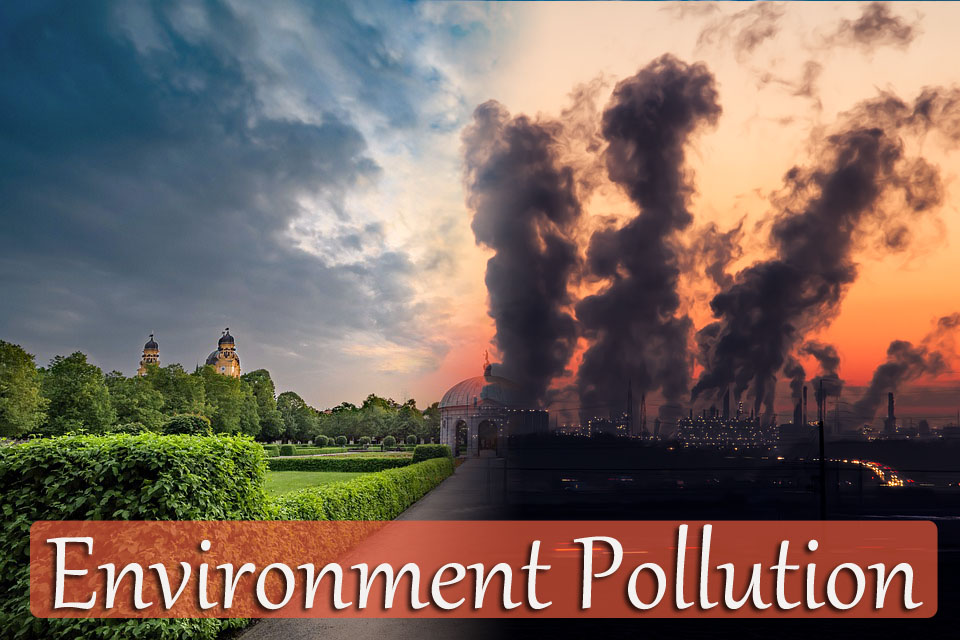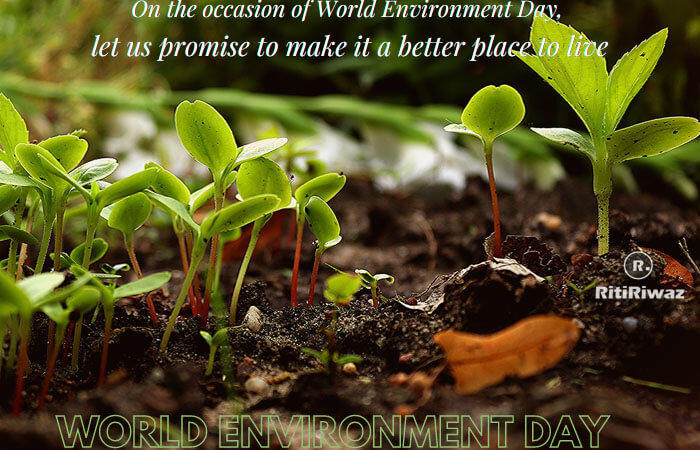Environment Pollution

The environment comprises all physical, social, and cultural factors and conditions influencing the existence or the development of an organism. Pollution is the process of making the environment dirty by adding harmful substances to it. Due to indiscriminate industrialization, man has created a state of decadence. He has continuously tampered with nature, which has resulted in a threat to the sustenance of mankind. Although attempts have been made to resolve nature to its previous state of purity and serenity, the efforts have not been wholehearted.
Earth is our home and we will pass it to our future generation as their legacy. But, if they inherit the present state of the world, they would be unable to sustain themselves. Man has steadily improved the technologies and other means necessary for higher production of wealth and for the availability of devices that could give more physical and mental comforts.
The Industrial Revolution led to a drastic escalation of the use of natural resources. Man exploited nature for its benefits, without any foresight as to what the implications of his actions would be. Indiscriminate industrialization has resulted in urban migration as the rural poor settled in cities could not accommodate the migrants. This has resulted in increased pressure on the available resources and further degradation of the environment.
Before the advent of modern civilization, a man respected nature. As there was no use of fertilizers, nature was not tampered with. Man practiced rotation of crops. This allowed the soil to replenish itself with necessary nutrients and regenerate itself. But, modern man has choked the soil with fertilizers, insecticides, and pesticides.
Thus, the soil is getting polluted day by day by hazardous material and micro-organisms, which enter the food chain. As a result, there are numerous health problems. Those bacteria, which are transmitted from air to soil infect man causing bacillary dysentery, cholera, and paratyphoid fever. Increased use of plastics, polythenes, and other non-biodegradable products has led to the problem of their disposal.
Also Read: World Environment Day June 5
Environmental pollution has led to the pollution of water, soil, and air. Three-fourths of the earth consists of water, yet there is a scarcity of potable water. in India, all the sources of potable water, like rivers, lakes, ponds, and wells have been polluted and declared unfit for drinking.
The Yamuna, when it enters Delhi through the Wazirabad barrage, is clean, but when it leaves Delhi, is a black, coagulated mixture of dirt, sewage, and industrial waste. As a result of the increased use of fertilizers, the river water, seas, and oceans have been contaminated with harmful pollutants. The harmful fertilizers and insecticides have seeped through the earth and polluted the groundwater. Oil slicks and pollution caused by the flow of industrial wastes, sewage, and fertilizers have threatened aquatic life. Polluted water supply in the cities results in the year in epidemics, like cholera, jaundice, and gastroenteritis.
Air pollution is the one direct implication of industrialization. Smoke emitted from the chimneys of industries and the fumes of the vehicular traffic cause air pollution. Air pollution also increases when forests catch fire, rubber plants are gutted and plastics are burnt along with the household garbage. In Indonesia, some farmers set fire to a part of a forest in an attempt to clear it. But, the fire engulfed large parts of the forest before it was put out. This resulted in the spread of heavy smoke over entire South-East Asia, leading to severe air pollution.
Suggested Read: World Environment Day Wishes
The Taj Mahal in Agra, one of the seven wonders of the world, is affected by the fumes emitted by the Mathura Refinery. Reports estimate that the monument would get defaced within a span of 20 years because of the harmful effluents of the refinery. Smog, a mixture of fog and smoke, hovering over the cities early in the morning, is also the result of air pollution. The spread of radioactive material in the air has increased as a result of the discovery of artificial radioactivity and the technique of harnessing nuclear energy. This radioactive pollution may cause cancers. abnormal births and other health-related problems.
The emission of greenhouse gases (GHGs) in increased concentration has led to climatic changes. The largest and most important GHG is carbon dioxide (CO2) which is formed on account of the burning of fuels of all kinds. The Intergovernmental Panel and Climate Change (IPCC), which is the most authoritative scientific body investigating all the aspects of climate change, stated in its fourth assessment report that global warming may have a devastating impact on the climate of the earth.
It is very likely that climate change can slow down the pace of progress towards sustainable development either directly through increased exposure to adverse impact or indirectly through erosion of the capacity to adapt. The increase in pollution has resulted in global warming. The ice caps in the polar regions would melt and submerge the low-lying areas and islands. The depletion of the ozone layer could result in skin disease because of exposure to the ultraviolet rays of the sun.
The modern world has a new pollution to face, the noise pollution, caused by loudspeakers, aircraft, processions, and rallies. Research has shown that noise pollution is capable of causing ulcers, abortions, cardiovascular diseases, and hypertension. The first and most important cause of pollution is the growing population. Another important factor is rapid industrialization and haphazard urbanization. With urbanization, people from the villages migrate to the cities in search of livelihood. As the cities are unable to provide shelter for all, they take refuge in slums. The appalling conditions of the slums stand testimony to the price man is paying for urbanization.
The forest cover in India is shrinking alarmingly due to overgrazing and other forms of overexploitation. Fuel-wood removal from our forest is recorded at 235 cubic meters, which grossly exceeds the sustainable limits of 48 cubic meters. India is categorized as a mega-center of biological diversity, is seriously threatened by indiscriminate environmental pollution.
The pollution problem cannot be isolated from questions of economic progress, political stability, social awareness, migration, and international aid. No doubt, the problem is multifaceted and complex, but the global consciousness on the issue of the environment has been on the rise since the United Nations Conference on Human Environment (UNCHE) held in Stockholm in 1972. The Policy Statement on Abatement of Pollution, 1992, provides instruments in the form of legislation and regulation to prevent and control pollution.
Various operations were undertaken by the government, such as the ‘Clean Ganga Plan’. Nationwide water quality is monitored regularly under the National Water Quality Monitoring Programme (NWMP) through a network of water quality monitoring comprising 1245 stations in 27 states and six union territories. The monitoring network covers 695 monitoring stations on rivers, 86 monitoring stations on lakes, 9 monitoring stations on tanks, 26 monitoring stations on ponds, 12 monitoring stations on creeks, and 19 monitoring stations on canals. Water quality of 293 rivers in major, medium, and minor basins is observed in the country.
Nationwide air quality is monitored regularly under National Air Quality Monitoring Programme (NAMP) through a network of air quality monitoring comprising 365 operating stations at 141 cities/towns in 26 states and five Union Territories of the country. Under NAMP, four air pollutants, viz., Sulphur Dioxide (SO2), Oxides of Nitrogen as NO2, Suspended Particulate Matter (SPM), and Respirable Suspended Particulate Matter (RSPM or PM10), have been identified for regular monitoring at all the locations.
The Ministry of Road, Transport, and Highways conduct the National Environmental Awareness Campaign (NEAC) every year. If we honestly abide by all the rules and commit ourselves accordingly, we could redeem our duty towards nature. All the nations of the world should work to control environmental pollution in their respective countries. Only then can a man be proud of his intellect and prove his superiority over other creatures of the world.
Suggested Read: World Environment Day Quotes






